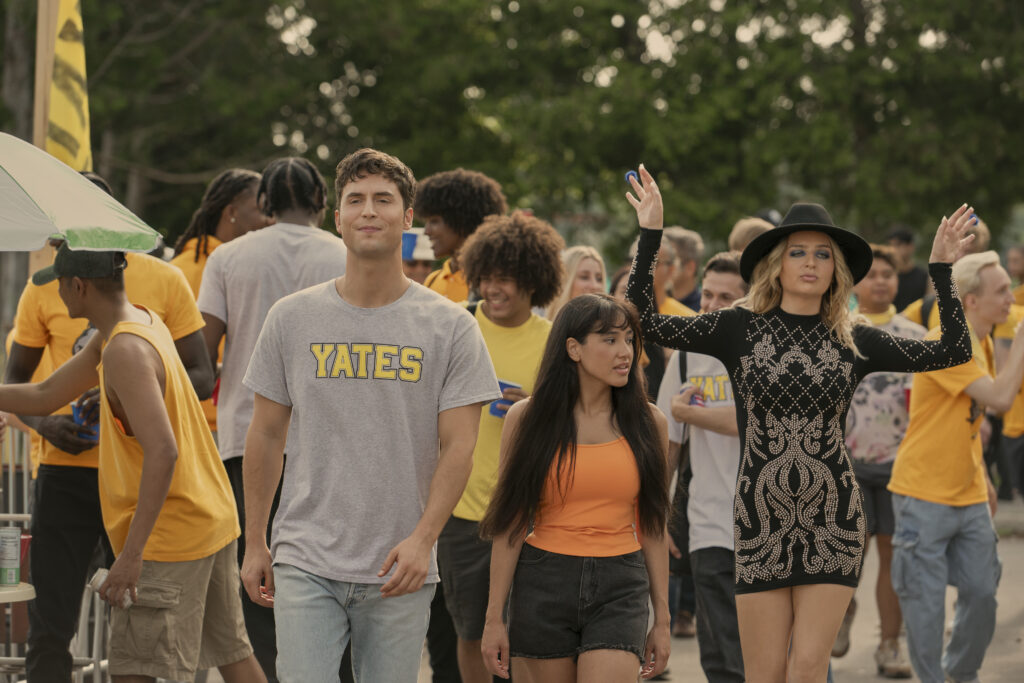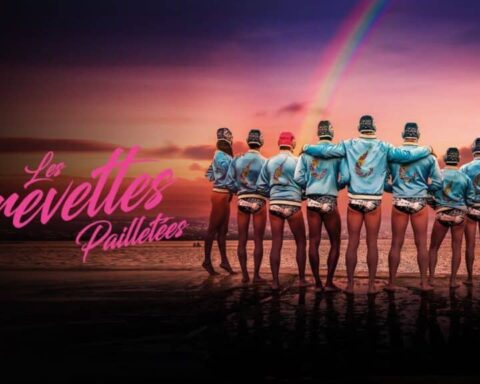Amazon Prime Video’s Overcompensating is a rare gem in the world of streaming comedies—a riotous, deeply sincere exploration of queerness, masculinity, and self-acceptance wrapped in frat-boy absurdity and delivered with both style and soul. Co-created by and starring internet sensation Benito Skinner, the series walks the tightrope between broad comedy and tender emotional truth with surprising elegance. While it may open with a chest-thumping, “I’m totally straight!” energy, what unfolds over its eight episodes is a refreshingly heartfelt LGBTQIA+ narrative that earns every laugh—and every tear.
From Meme to Mainstream
For those familiar with Skinner’s online alter ego, Benny Drama, the tone of Overcompensating may come as a surprise. Known for his wild, campy impressions of Hollywood’s elite and reality TV’s most chaotic personalities, Skinner built a fanbase by leaning all the way into parody. But here, he dials back the antics to play Benny, a closeted college freshman attempting to convince everyone—most importantly himself—that he’s the epitome of hetero masculinity. Gone are the wigs and Instagram filters. Instead, we get Skinner stripped down (literally and metaphorically), playing a young man teetering on the edge of emotional awakening.
When we meet Benny, he’s alone in his dorm, delivering an awkward mirror monologue: “Hey, what’s up everybody. I’m Benny. I love pussy.” The line is delivered with forced bravado and undercut immediately by flashbacks of him rewinding George of the Jungle to rewatch Brendan Fraser shirtless, or recoiling in discomfort from his prom date’s kiss. This isn’t a joke about closeted youth—it’s a window into Benny’s internal war, made accessible through comedy but rooted in real emotional pain.

A Frat House Farce with a Tender Heart
Set against the backdrop of Benny’s first year at university, Overcompensating plays with familiar college tropes—wild parties, eccentric roommates, embarrassing hookups—but gives them a twist through its queer lens. As Benny tries to bury his true identity beneath a pile of Red Bull vodkas, bro-y slogans, and Nicki Minaj karaoke (his tipsy performance of Super Bass is both hilarious and poignant), the show slowly peels back his layers, revealing a boy who’s not only scared of being outed but of discovering who he really is.
Thankfully, Benny is not alone on this journey. The show’s rich ensemble adds depth and color to every episode. Carmen (Wally Baram), his whip-smart and emotionally guarded classmate, quickly becomes his closest ally. With a dry wit and a powerful grief arc of her own—her older brother passed away the year before—Carmen grounds the show’s more manic moments with genuine pathos. Their friendship is one of the most beautifully drawn relationships in the series: platonic, tender, and rooted in mutual support.
Then there’s Hailee, Carmen’s roommate, played with anarchic brilliance by Holmes. A human tornado of over-sharing, inappropriate miming, and chaotic wisdom, Hailee brings energy to every scene she touches. She’s the kind of queer-coded character who might’ve once been played purely for laughs, but here she’s fully realized—ridiculous, yes, but also empathetic and endearingly loyal.
Adam DiMarco (of The White Lotus fame) is another standout as Peter, Benny’s pseudo mentor and the boyfriend of his older sister Grace (Mary Beth Barone). Peter is every college bro distilled into a single body: confident, loud, painfully sincere in his use of “yees” and “nahs”—and, bizarrely, not entirely toxic. In lesser hands, Peter would be a caricature, but DiMarco imbues him with surprising warmth. His attempt to mold Benny into his own version of manhood culminates in one of the series’ most iconic scenes: a frat orgy of shirt-ripping, roaring, and male bonding so over-the-top it feels like a fever dream. And yet, the comedy never loses its edge of commentary. The absurdity of macho rituals is on full display, and Overcompensating manages to laugh with and at these characters at once.




Laughs and Feels in Equal Measure
What’s most remarkable about Overcompensating is its ability to seamlessly blend slapstick comedy with moments of real vulnerability. While Benny’s journey of self-discovery is the emotional throughline, the show is filled with small, sharp gags that elevate its world. There’s the perpetually naked roommate who sleeps through ragers. The stoner film student who can’t stop praising The Godfather. The guy who declares he needs to pee every time someone speaks to him. Even the setting itself—an exaggerated version of an American university—feels designed to expose the ridiculousness of rigid social roles, particularly around gender and sexuality.
Yet for all its quirkiness, the show is unafraid to be earnest. It wears its heart on its Abercrombie sleeve. Benny’s growing realization that he can no longer perform straightness, his budding feelings for a sweet, socially awkward classmate, and his clashes with a father who can’t quite see him—all are treated with care and respect. Kyle MacLachlan’s turn as Benny’s emotionally stunted dad offers a powerful look at generational disconnect, and a later scene where the two finally confront their differences is quietly devastating.
Overcompensating Is Not Just Representation—Celebration
Overcompensating is proudly queer, but more than that, it’s joyous in its queerness. It doesn’t just show the struggle of coming out—it shows the euphoria of coming into oneself. There’s an underlying message to the show that feels quietly radical in its optimism: that self-love isn’t just possible, it’s essential. That queer joy is worth celebrating. That you don’t have to be perfect or ready or fearless to be loved for who you are.
It’s also a show deeply aware of the tension between performative identity and authenticity. Benny’s early attempts to hide behind performative masculinity are as much about safety as they are about self-denial. But as he lets go—awkwardly, hilariously, heartbreakingly—the audience gets to witness not just a coming out, but a coming alive.

Your Heart Will Be Stolen by Overcompensating
Don’t be fooled by the party-boy antics and satirical tone: Overcompensating is a feel-good LGBTQIA+ dramedy that knows exactly what it’s doing. It delivers laughs, yes—but it also delivers catharsis. Benito Skinner has crafted a series that pays homage to his internet roots while evolving into something richer and more meaningful. At a time when so much queer media is centered on trauma, Overcompensating dares to be joyful, nostalgic, and full of hope.
Whether you’re newly out, long out, or just looking for a smart, warm, and funny story about finding your place in the world, Overcompensating has got your back—and maybe your heart, too.









